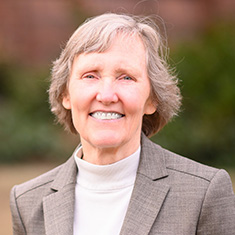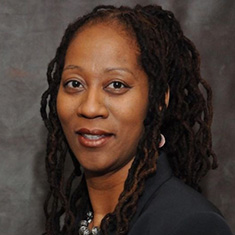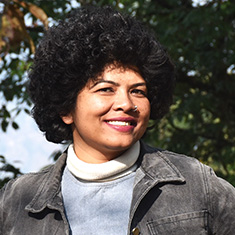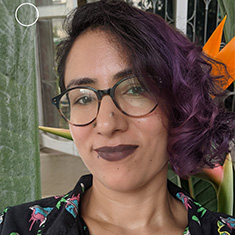2022 Wall Award recipients addressing shortcomings in mental health, education
Dec. 15, 2022 — Three projects developed by four Grinnell College graduates have been selected for the 2022 Joseph F. Wall ’41 Alumni Service Awards.
Kathryn Railsback ’80, Kimberly L. King-Jupiter ’87, Mamata Pokharel ’07, and Raji Manjari Pokhrel ’08 are the recipients of the awards. Pokhrel and Pokharel are teaming up on a combined project.
The award is named in honor of Joseph F. Wall ’41, professor of history and longtime dean of the College, who inspired the ideal of social responsibility in his students. It was established as a tribute to the College’s tradition of social commitment.
Each year, a committee composed of alumni (including previous Wall Service Award winners), a student, and faculty members, reviews applications and awards the $40,000 prizes to either jump-start or complete a project that shows creativity and commitment to effecting positive social change.
During the past 26 years, the Wall Service Award has been presented to 64 individuals who have contributed their time and talents to 57 diverse projects throughout the U.S. and 17 other countries. The College has given out more than $1 million to alumni through this award program.
The following is a closer look at the projects of this year’s recipients.
Kathryn Railsback ’80
 Kathryn Railsback ’80
Kathryn Railsback ’80
Railsback is organizing and implementing trauma education and resiliency workshops for South Sudanese refugees in Kenya and Uganda. Described by the United Nations as “the largest refugee crisis in Africa,” at last count more than 1 million South Sudanese refugees were living in substandard conditions in Kenya and Uganda.
Railsback will be implementing a trauma education and resiliency methodology called Healing and Rebuilding Our Communities – or HROC for short – that was developed under the auspices of the African Great Lakes Initiative of Friends Peace Teams by genocide survivors in Rwanda and Burundi in the early 2000s. Railsback was trained as a HROC facilitator in Rwanda in 2013 and has made nine trips back to East Africa to facilitate workshops since then.
“HROC is an effective peer-led, community-based model for helping people who have suffered traumatic experiences,” she says. “It is especially valuable in high-conflict, low-resource areas. It includes education on the causes and symptoms of trauma, and on handling loss and grief. Participants also discuss constructive versus destructive means of handling anger and how to rebuild trust within communities. Workshops are highly interactive, with small and large group discussions, games, movement, and shared meals.”
Railsback and the African Great Lakes Initiative have already identified trainers and facilitators to initiate workshops and trainings in the Kakuma Refugee Camp in Kenya and in northern Uganda.
A resident of Poulsbo, Washington, Railsback is a resident activist at the Ground Zero Center for Nonviolent Action. She campaigns for reducing U.S. military expenditures, in part because it diverts resources from serious humanitarian needs in other parts of the world.
“When I bring firsthand accounts from places like Kakuma Refugee Camp, it makes my advocacy with U.S. policymakers and others more effective,” she says.
Kimberly L. King-Jupiter ’87
 Kimberly L. King-Jupiter ’87
Kimberly L. King-Jupiter ’87
King-Jupiter, who has a doctorate in education policy, is piloting an educational initiative in Alabama to bolster student performance and the engagement between students, teachers, and parents. The project is called Building-Students.With.Academic.Greatness, or B-S.W.A.G. for short.
A professor in the doctoral program in Educational Leadership, Policy and Law at Alabama State University, King-Jupiter will partner with a public middle school in Montgomery, Alabama, that serves 641 sixth through eighth graders. Eighty three percent of those students are economically disadvantaged.
“As an African American woman raised by my mother on a very limited income, I was the first person in my family to go to and complete college,” King-Jupiter says. “So, I understand at a visceral level the way schools treat students from families deemed ‘at-risk.’ Across my career, I have developed and implemented collaborative projects that serve urban and rural populations
underserved by schools.”
This project is a replication and expansion of Students.With.Academic.Greatness, which was organized by King-Jupiter in Nashville five years ago. B-S.W.A.G. is an incentive program that rewards students, parents, and teachers for working collaboratively.
“For populations historically marginalized in schools, the type of mutual respect that needs to exist for the school and home to function separately is less possible because most aspects of schools denigrate the language, culture, and perspectives of diverse populations,” King-Jupiter says. “An initiative that incentivizes increased contact and communication between parents and teachers has the potential to enhance students’ overall academic performance.”
Wall funding will help supply lapel pins for students, gift cards for teachers, and gift baskets for families when each meets the established criteria.
Mamata Pokharel ’07 and Raji Manjari Pokhrel ’08
 Mamata Pokharel ’07
Mamata Pokharel ’07
To expand the reach and scope of mental health conversations in Nepal, Pokhrel and Pokharel are starting a podcast to kindle nuanced conversations on mental health in Nepal. The podcast, informed by workshops, interviews, conversations, and surveys on relevant topics, will help the two therapists in Kathmandu expand impact beyond the therapy room.
“We want to normalize experiences of distress, rather than stigmatize or medicalize it,” Pokhrel says. “We want to stay close to the context of Nepal – and how people experience and deal with mental distress in the country in unique, and not-so-unique ways. And we want to have conversations that locate mental health problems not within individual bodies but within systems of power, and thus create space for individuals, families, and societies to bring their skills and know-hows to dealing with the problem.”
The 10 podcast episodes, which will be titled Utar Chadav (loosely translated as ups and downs), will begin in February 2023. Two of the proposed episodes include, “When addiction comes knocking” and “Being witness to the expansiveness of gender and sexuality.”
 Raji Manjari Pokhrel ’08
Raji Manjari Pokhrel ’08
For each episode, narratives of lived experiences will be collected through pre-production workshops, and surveys with groups of intended audiences, including high school students, teachers, working mothers, survivors of gender violence, survivors of addiction, and members of the LGBTQI+ community.
“Introducing mental health topics carefully through representative storytelling, we aim to rob dominant discourses and social taboos of their power by introducing alternatives from lived experiences around us,” Pokharel says.
The Wall funding will help with workshop logistics, website, design material, marketing, and podcast production.
“We hope that by getting our podcast noticed and valued through this grant, we will be able to figure out funding mechanisms that can lead us to long-term sustainability,” Pokharel says.
—by Jeremy Shapiro